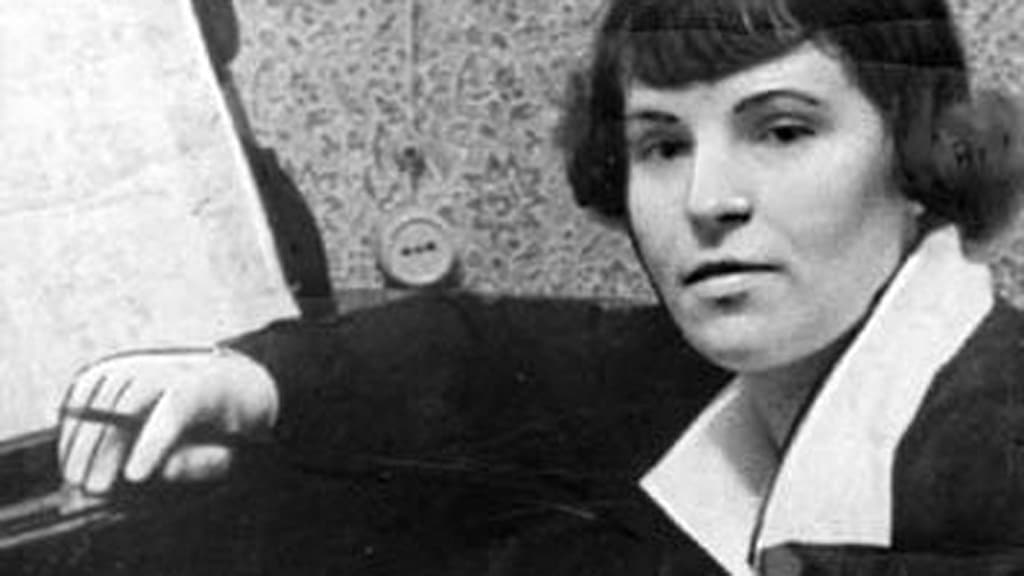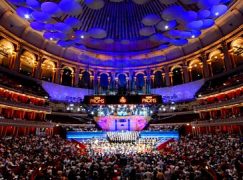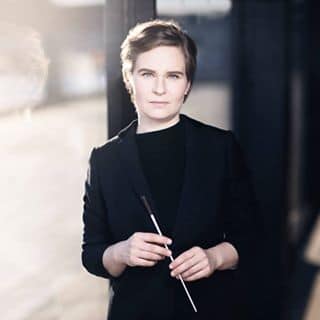Discovering a Russian recluse in California
mainChristopher Russell is about to perform the scarcely-heard fifth symphony by the intriguing Leningrad hermit, Galina Ustvolskaya. Chris tells Slipped Disc how this came about:
When California began its lockdown from the COVID-19 pandemic last spring, I set myself a personal artistic project to explore some new orchestral repertoire. As a conductor, I’m always on the hunt to discover something new and/or shine a light on some lesser-known music that I believe needs to be heard. I decided my project would be symphony cycles by composers whose complete set I’d not heard before. By the end of the summer, I’d listened to the cycles of 18 different composers totaling 122 symphonies. They included the cycles by Malcolm Arnold, Mozart Camargo Guarnieri, Louise Farrenc, William Grant Still, and even the 10 symphonies by Chinese composer Zhu Jian’er.
One symphony cycle I decided to listen to was of the Russian composer Galina Ustvolskaya (1919-2006). I’d come across her name only in the last ten years or so and knew she had a bit of a cult following. But that’s about it.
Ustvolskaya wrote five symphonies ranging from about eight to 25 minutes. They can all be heard in about 75 minutes. All five have some sort of spoken or sung text with Nos. 2-5 based on religious themes. Ustvolskaya’s music often explored Christianity and she talked about its importance in her life although, by her own admission, she pretty much never set foot inside of a church.
She once said “There is no link whatsoever between my music and that of any other composer whatsoever, living or dead”. At first, I thought this was a fairly arrogant thing to say but the more I explored her music, the more I came to realize that this was an accurate statement. Her unique instrumental combinations, strange harmonies, and repeated blocks of sound make for a unique listening experience. It quickly drew me in.

I’m an Associate Professor and the orchestra conductor at Azusa Pacific University, near Los Angeles. With the pandemic still raging through the summer, we followed most universities in California and moved our fall semester completely online. Obviously, this made for wild challenges in trying to do orchestra online via Zoom where even getting two people to play together is pretty much impossible. With my fall concert plans thrown out the window, I had to come up with some repertoire alternatives that focused on recording projects. I decided it was best and most manageable to divide the full orchestra into different-sized chamber orchestras. Coming off of my summer listening project, Ustvolskaya’s music came to mind as being both worth doing and doable in our new circumstances. Her Symphony No.5 “Amen” seemed a perfect fit.
The symphony is scored for only five instruments: oboe, trumpet, tuba, violin, and wooden cube. It also includes an actor who recites the Lord’s Prayer. It will be in English, not the original Russian, as Ustvolskaya said it can be done in the language of the performers.
Ustvolskaya also left specific instructions in the score for building the wooden cube. Her official website is very specific that she wanted this instrument to be a cube, not some coffin-shaped object as seen in other performances. Since most places don’t have wooden cubes built to her exact specifications lying around, the Operations Manager at our School of Music set out to construct one. I tried our newly-completed cube the other day and it sounds terrific. I am smiling under my mask.
I’ve worked with all the players on the symphony and they are also taken with Ustvolskaya’s singular sound world. We’re in the process of recording it with a goal of releasing the video next month.
There’s something completely compelling about this music. It doesn’t unfold the way a symphony is “supposed to”. It makes complete sense when you realize this is one person pouring out their heart to God. Prayers don’t typically follow sonata form. Thus, you’re taken on this personal and powerfully unique listening experience.






getting even the name of this blog wrong is a new low (fat fingers, eh Norman? less haste, more accuracy, or just better proof-reading :))
Fascinating. A vivid reminder, if one was needed, that is you want to know the totality of what is being done that’s new and interesting, you must not overlook our university orchestras, which are under no pressure to sell tickets or fill halls or help accumulate social Brownie points for a Board of Trustees. There are still a lot of them out there and some fine musicians conduct them. Mr. Russell should be thanked. Just on paper I love the “orchestration” of this symphony.
And if he is looking for another overlooked composer of symphonies, I put forward the name of Israel Kremen.
He might want to investigate her earlier Dies irae, or “Composition 2,” which also wants a wooden cube along with eight double basses and a piano. These are of course chamber, or ensemble, pieces despite the naming.
GU was D.Shostakovich pupil. There was personal relation, even love affair. My friend Semon Bokman was her student and wrote bio book on her. Her music known and played in Europe-thank to Alexey Lubimov. I have cd of piano sonatas.
If she indeed had a love affair with Shosh, that would explain the harshness of her music, and the bitterness of Shos’ pensive adagios.
Russian grocery stores in LA have excellent choices of canned meat, canned fish and especially condensed sweetened milk made in Belarus plus countless jars of pickled vegetables from all over Eastern Europe. Instead, in December of 2020 grown adults are building wooden cubes designed by deceased members of the USSR Composers Union and smiling under their masks.
I have heard that there are cans with pickled Russian dissidents circulating in supermarkets in Virginia.
Excellent! Looking forward to the video. I came across some of Ustvolskaya’s piano works while surfing around on YouTube last year. They are fascinating, compelling, and sometimes disturbing works, and not easily forgotten.
Here it is:
https://www.youtube.com/watch?v=QxjwhTCq2eY
It’s very Russian, very odd, very primitive (in the sense of underdeveloped), and seems to be an apt musical description of life in the USSR. The rope is delivered free with the score.
“There is no link whatsoever between my music and that of any other composer whatsoever, living or dead.” That is not an expression of pride or arrogance, but of tragedy, and hence the poverty of Mrs U’s musical ideas. But for Russian experience, no doubt that is exactly appropriate for what she wanted to express.
John, underdeveloped and primitive nations do not become the first to fly to space. Those who believe that such things are possible are not very complicated themselves. But you don’t strike me as a simple type at all. The Soviet government correctly viewed modern, depressive, purposefully ugly art as ideological sabotage bordering on treason. Nobody in the West will listen to such Russian music and say that it expresses the warped inner world of its creators, oddly finding reasons for writing ugly stillborn pieces amidst the breathtaking Holy Russia. There’s no money in such opinions. The so-called modern Russian art is a soil on which only poisonous opinions can grow. Here is an interesting double standard, ugly Russian music is due to ugly Russian life and not the ugly inner world of the composer. Divine European music of the past reflects on the divine souls of its creators and never attributed to the divine lifestyle in the 18th century Europe with its heads on spears and burning executions in every square, hideous untreated diseases and raw sewage running the streets. One needs to use equal standards and claim that if you put a Soviet modernist in the 18th century Vienna, that creature would produce the Jupiter symphony, while Mozart placed in the spacious Moscow apartment that belonged to Shostakovich, with running hot water and a telephone, after looking out the window and seeing instead of heads rotting on spears, the Soviet working class going to work in the morning, would write Shostakovich symphonies instead. Soviet industrialization is uglier than medieval daily public spectacles of butchery, starvation, cholera and raw sewage to complete the atmosphere. Doesn’t the music of Bach and Mozart prove this theory? Either art is mostly the result of surroundings and life circumstances or the product of the unique psyche of the creator. Double standards in art are scams like in every other case.
There’s a lot of raw sewage in Mozart, only sub rosa.
PS:
I hear from my PA that she had an uncle who played the tuba as a hobby, ordered the score of this piece to play it together with his friends, and the parts came indeed with ropes enclosed. They were so desperate after three rehearsels that they all hung themselves and it was the greatest tragedy in the family. She still cannot talk about it.
A fascinating account. I look forward to seeing your video, hopefully on YouTube.
That’s quite a wide range for the tuba part, isn’t it? Pedal C all the way up to G above middle C…
Given the indigestible nature of Soviet life, the tuba pedal tones seem quite appropriate.
I look forward to hearing it — authentic instruments, and all!
There exists an authentic Soviet tuba constructed in the twenties which produces a pedal tone an octave lower than the usual instrument. But it can only be heard by Russians, because the vibrations are on an emotional depth inaccessible by happier people.
Bravo, Mæstro! for the idea and, I’m sure, the execution.
So if this is going to be on Zoom, how do we listen?
If all conductors were as curious as Christopher, the music world would be a very different place, and much more vibrant — plaudits to him.
Why would performers in the classical music world be curious, if they have an extensive repertoire which happily invites for safe routine and mental relaxation?
Not quite the first US performance (https://www.youtube.com/watch?v=QxjwhTCq2eY), but the more this amazing woman’s work is heard the better. To misquote Spock “It’s music, Jim, but not as we know it”.
I have cd of piano concerto #1 by GU written 1946.Pianist Alexey Lubimov championed her music. GU influenced her teacher D.Shostakovich.